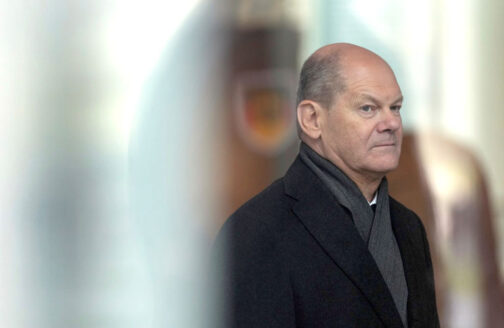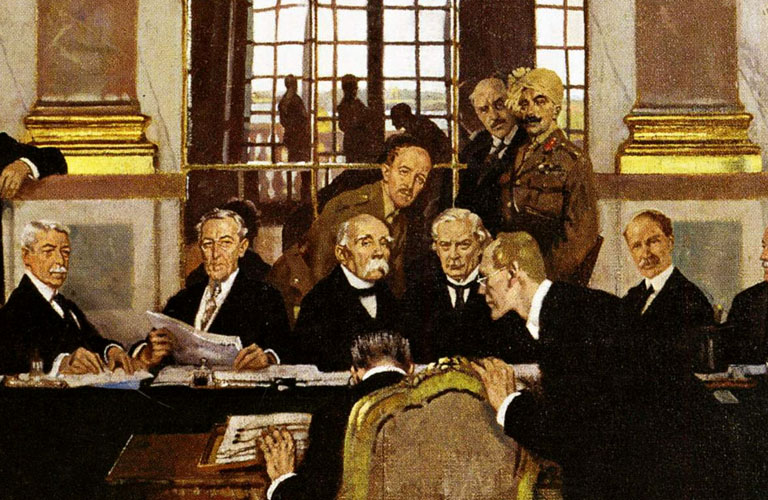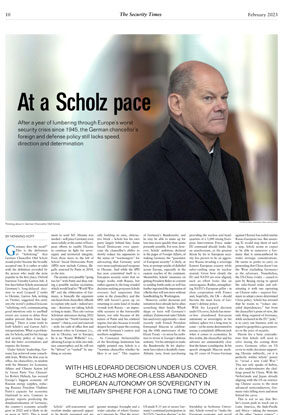At a Scholz pace
 Thinking about it: German Chancellor Olaf Scholz
Thinking about it: German Chancellor Olaf Scholz
Credit: picture alliance / ASSOCIATED PRESS | Michael Sohn
After a year of lumbering through Europe’s worst security crisis since 1945, the German chancellor’s foreign and defense policy still lacks speed, direction and determination
Germany does the most!” This is the definition of “Scholzing” that German Chancellor Olaf Scholz would prefer become the broadly accepted one. It is rather at odds with the definition provided by the person who made the term popular in the first place, Oxford historian Timothy Garton Ash. A few days before Scholz announced Germany’s long-delayed decision to send Leopard 2 tanks to Ukraine, Garton Ash, writing on Twitter, suggested this entry into the world’s political lexicon: “scholzing, verb, communicating good intentions only to use/find/invent any reason to delay these and/or prevent them from happening.” There is some truth to both Scholz’s and Garton Ash’s interpretations. What is problematic for Scholz, and for his foreign and security policy at large, is that the latter overshadows and impairs the former.
Under Scholz’ leadership, Germany has achieved some remarkable feats. Within his first year in office, his chancellery, in tandem with the Ministry for Economic Affairs and Climate Action led by Green Party Vice Chancellor Robert Habeck, has weaned Europe’s biggest economy off Russian energy supplies, reducing Russian President Vladimir Putin’s capacity for economic blackmail to zero. Contrary to gloomy reports predicting the deindustrialization of Germany, the country’s economy actually grew in 2022 and is likely to do so again in 2023. This is good news not only for Berlin, but also for Brussels and the rest of the continent.
It is also true that Germany, if not doing “the most” – that continues to be the job of the United States under Joe Biden, one of the most, but probably also last, trans-Atlanticist US presidents – does quite a lot. It is now housing over a million Ukrainian refugees, providing humanitarian aid, supporting Ukraine financially and delivering a vast array of military hardware which, given the desolate state of Germany’s armed forces, is trickier than the outside world would often think.
The decision announced on Jan. 25 to finally give way and send Leopard 2 tanks to Ukraine – which the chancellery deemed to contain so much potential for an escalation in violence that US cover in the form of a commitment to send M1 Abrams was needed – will place Germany even more solidly at the center of European efforts to enable Ukraine to continue its fight for sovereignty and territorial integrity. Even those more to the left of Scholz’ Social Democratic Party (SPD) now include Crimea, illegally annexed by Putin in 2014, in the mix.
The anxiety over possibly “going too far” with Putin and thus risking a possible nuclear escalation, which would lead to “World War III” and the obliteration of Germany, is basically the argument one hears from chancellery officials to explain why such – indeed serious – decisions are taking Scholz so long to make. They cite various Scholzian utterances during 2022 to explain his “North German by nature” – that is, cool and reserved – style: his oath of office first and foremost refers to Germany (i.e., not to Ukraine, not to Europe); he is no “Kaiser Wilhelm” (i.e., allowing Europe to slide into military catastrophe); and he will not be “driven” or “rushed” by anything or anyone.
Scholz’ self-assessment and resolute modus operandi appear to be deeply ingrained and are setting the chancellor up – if not for failure, then at least for significantly diminishing his potential for leadership on the European and international stage.
This is all the more regrettable since Scholz’ coalition partners, the Greens and the pro-business Free Democrats (FDP), have pushed the chancellor – behind the scenes yet increasingly openly – to act more swiftly and with greater clarity. It’s an open secret that Foreign Minister Annalena Baerbock had been arguing in favor of helping Ukraine with tank deliveries since the summer; FDP chair of the Bundestag defense committee, Marie-Agnes Strack-Zimmermann, even spoke of a “German failure.”
Contrary to reports of the chancellor actually presiding over a four-way coalition – with the left wing of the SPD supposedly building its own, obstructive block – Scholz has his own party largely behind him. Some Social Democrats even appreciate the chancellor’s ability to slowly reduce his opponents to the status of “warmongers” for advocating that Germany send ever-more sophisticated weapons to Ukraine. And while the SPD has now committed itself to a European security order that no longer works with Russia, but rather against it, the long-winded decision-making processes Scholz oversees fuel suspicions that some in the chancellery and the SPD still haven’t given up on returning to some kind of modus vivendi with Russia – an impossible scenario in the foreseeable future, not only because of the nature of Putin und his criminal regime, but also because it would deepen beyond repair the existing rift with Germany’s eastern and northern neighbors.
As Constanze Stelzenmüller of the Brookings Institution has rightly pointed out, Scholz is a “wartime chancellor whether he likes it or not.” This requires greater strategic foresight and a wider calculus of where Germany’s interests lie. That the provision of Western-made armored fighting vehicles as well as main battle tanks (and sooner or later fighter jets as well) would be needed to help Ukraine within a year of Russia’s invasion was clear early on – along with the need for greater amounts of ammunition. However, no preparations or contingencies were made in spring or summer; thus, when decisions were finally taken – at Scholz’ insistence – “in strategic lockstep” with the United States, Germany’s leadership and armed forces had to scramble each and every time.
Having put ill-fated and ill-suited Christine Lambrecht in charge of the defense ministry has meant a lost year in the Herculean task of turning Germany around militarily. Her successor, Boris Pistorius, has shown the skill, deftness and can-do attitude that is now urgently required at the top of Germany’s Bundeswehr, and he may be able to make up for lost time more quickly than seems presently possible. For now, however, Scholz’ ambition, declared in the pages of Foreign Affairs, of making Germany the “guarantor of European security” is likely, at best, to prompt smirks of disbelief across Europe, especially in the eastern reaches of the continent. Meanwhile, Scholz’ insistence on getting President Biden to commit to sending battle tanks as well has further ingrained the impression of a Berlin that will not move without handholding by Washington.
However, earlier decisions and initiatives have already led to allies scratching their heads: Which shape or form will Germany’s military Zeitenwende take? Scholz has used every opportunity – most recently with French President Emmanuel Macron in celebrating the 60th anniversary of the Elysée Treaty – to stress his ambition to invest in Europe’s defense industry. Yet his attempts to make the Bundeswehr fit for deployment have taken a decidedly trans-Atlantic turn, from purchasing US-made F-35 jets to secure Germany’s continued participation in NATO’s “nuclear sharing” to his European missile defense initiative based on Israeli and US technology – a move not coordinated with Paris, which led to Macron’s unprecedented step of postponing the Franco-German Council of Ministers meeting last fall.
Meanwhile, the Franco-German-Spanish Future Combat Air System (FCAS) project is moving painfully slowly, and apparently the corresponding Main Ground Combat System (MGCS) is not moving at all. At the same time, the chancellor’s commitment to providing the nucleus and headquarters of a 5,000 strong European Intervention Force under EU command already looks like an anachronism, as the greatest threat by far to European security has proven to be an aggressive Russia invading a sovereign Eastern European country while saber-rattling atop its nuclear arsenal. Given how closely the EU and NATO are now aligned, such an effort looks like an extravagance. Rather, strengthening NATO’s European pillar – in close cooperation with France and, hopefully, the UK – should become the main focus of Germany’s defense policy.
With his Leopard decision under US cover, Scholz has more-or-less abandoned European autonomy or sovereignty in the military sphere for a long time to come – yet he seems determined to pursue a completely different tack when it comes to economics. In this realm, the chancellor and his advisors are unmistakably clear that the future is multipolar. In his speech alongside Macron marking 60 years of Franco-German friendship at Sorbonne University, Scholz vowed to “make the European economic and social model fit for the future, without, it must be said, being taken in by those who preach the gospel of deglobalization and decoupling.”
To whom could the chancellor possibly be referring? Certainly not the Chinese. While China has only ever very selectively “coupled” with the global economy and has already put that process in reverse, Beijing is not “preaching decoupling” when it addresses European audiences. Indeed, in a charm offensive launched after the 20th Chinese Communist Party Congress, Chinese leaders are explicitly trying to widen the trans-Atlantic gap.
Scholz may have made very clear to Xi Jinping, on his ill-advised visit to Beijing last year, that a Chinese military move against Taiwan would end Sino-European economic relations in the same way Putin’s aggression against Ukraine has ended similar Russo-European ties. But assuming Xi would stop short of such a step, Scholz seems to expect to be able to maneuver a Germany that is unencumbered by wider strategic considerations. He seems to prefer to carry on pretending that China doesn’t see the West (including Germany) as the adversary. Nonetheless, the US-China rivalry – caused in part by Beijing trying to upend the rules-based order and substituting it with one operating on Chinese rules – requires Germany to adopt a more determined China policy. Scholz has stressed that he wants to “reduce one-sided dependencies,” but from the chancellor’s point of view, the only thing required of Germany, while anchored in the EU “pole,” is to carry out business with no regard to geopolitics, geoeconomics or the price of security.
Herein lies a basic contradiction that Scholz will need to solve during the coming three years: Germany relies on US cover to make decisions supporting Ukraine militarily, yet it is perfectly within Scholz’ power to “avoid a new Cold War.” This not only speaks of hubris, it also underestimates the challenge posed by China. With the Netherlands and Japan already aligning with the US on restricting Chinese access to the most advanced semiconductors, Germany risks falling more and more behind the curve.
This is not to say that Berlin’s recent push to reach out to Latin America, the Indo-Pacific and Africa – taking the measure of the other “power centers” – is misguided. On the contrary, Scholz is right to have Germany’s foreign policy focus more on the Global South, but he will need to enable his foreign ministry to put greater resources into this effort.
Trying to isolate the determinants of Germany’s security from its economic policy has gone badly wrong with Russia. Scholz needs to ensure it does not happen again with China. Accelerating Germany’s ascent to the status of functioning global military player, increasing the strategic clarity of where exactly the future of the country and continent lies and pursuing pan-European objectives with greater determination – these and other accomplishments would go a long way to ensuring that future dictionary readers agree on what “Scholzing” really means, namely “doing the best for Germany and Europe.”
Henning Hoff is executive editor of Internationale Politik Quarterly, the English edition of Internationale Politik, published by the German Council on Foreign Relations (DGAP).



